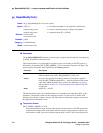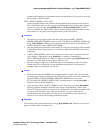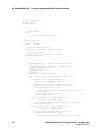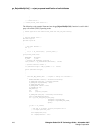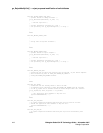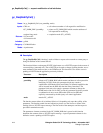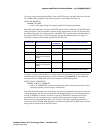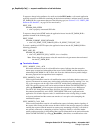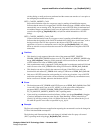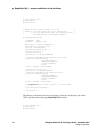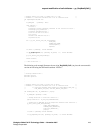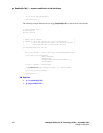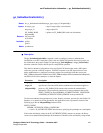
414 Dialogic
®
Global Call IP Technology Guide — November 2007
Dialogic Corporation
gc_ReqModifyCall( ) — request modification of call attributes
gc_ReqModifyCall( )
request modification of call attributes
Description
The gc_ReqModifyCall( ) function is used to initiate a request to the network or remote party to
change an attribute of the current SIP call.
This function initiates a subsequent INVITE (also known as a re-INVITE) request in the context of
a current dialog (connected call). The re-INVITE can be used to change signaling headers, one or
more attributes of the media session, or the DTMF mode. This function is also used to cancel a
pending re-INVITE that the application previously initiated.
The function returns either <0 (to indicate failure) or 0, depending only upon the validity of the
parameters. The function return does not indicate any status as to the success or failure of the
sending of the re-INVITE request message. The final result of the attempt to send the request is
provided in termination events.
The parameters elements contained in the GC_PARM_BLK that is passed to this function
determine the contents of the re-INVITE request message. A special parameter element is also
defined to cancel a pending re-INVITE request.
Name: int gc_ReqModifyCall (crn, parmblkp, mode)
Inputs: CRN crn
• call reference number of call targeted for modification
GC_PARM_BLK *parmblkp
• pointer to GC_PARM_BLK which contains attributes of
call requested for modifying
unsigned long mode
• completion mode (EV_ASYNC)
Returns: 0 if successful
<0 if unsuccessful
Includes: gclib.h
Category: Call Modification
Mode: Asynchronous
Parameter Description
crn call reference number of call targeted for modification
parmblkp pointer to GC_PARM_BLK which contains attributes of call requested for
modifying. In 1PCC mode, this parameter block may contain a
combination of SIP header fields and Global Call channel capabilities that
will be inserted into the SDP offer that the library formulates. The
parameter block may also contain a parameter element to change the
DTMF mode of the call. In 3PCC mode, this parameter block may contain
a combination of one or more SIP header fields and an SDP offer
explicitly constructed by the third party call control application.
mode must be EV_ASYNC



